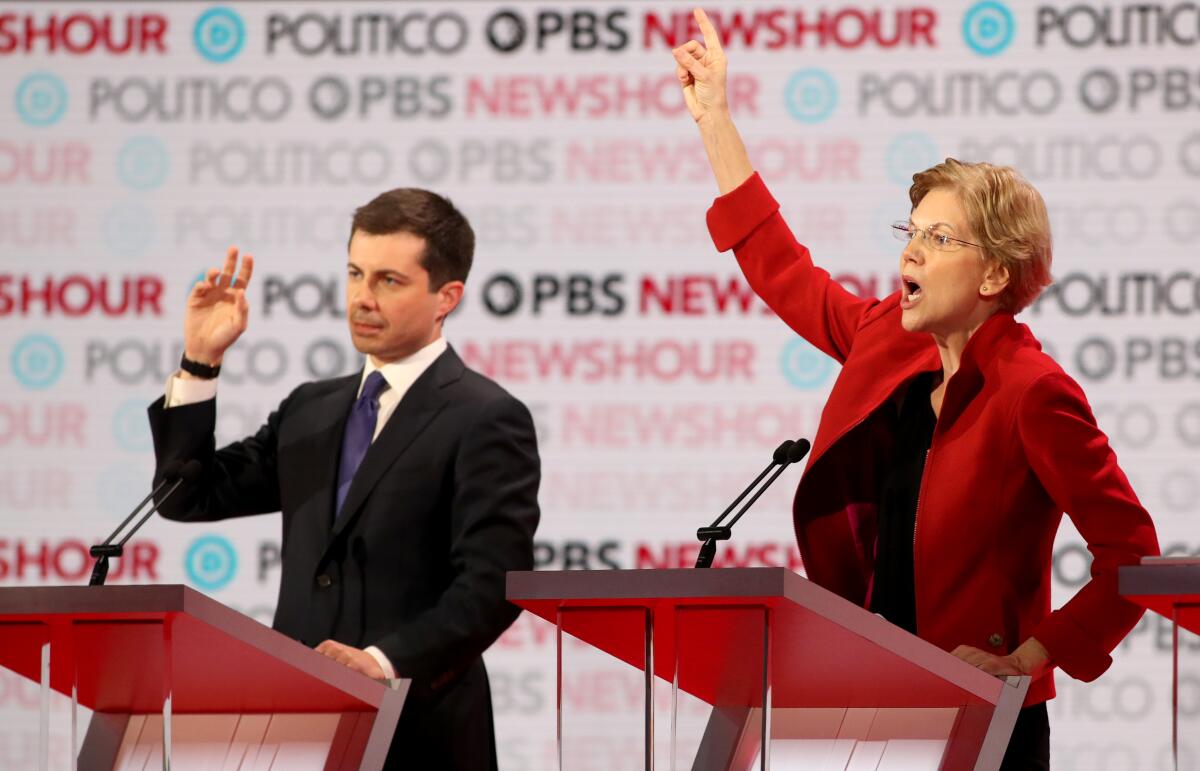Opinion: Why Mayor Pete’s ‘wine cave’ dinner is beside the point

Not since the Progressive Era has there been so much attention by presidential candidates on the question of fundamental reform of the institutions of our democracy. At least six candidates for president have committed to making reform a priority if elected —including arguably four of the top six Democrats, and one Republican — former Massachusetts Gov. William Weld.
Not that you’d know it listening to the moderators at the Democratic debates. Thursday night was the sixth debate in which no moderator asked a question about how the candidates would actually achieve democratic reform, other than improving voting rights. But in no debate has the issue been as vigorously pressed by the candidates themselves, both helpfully and not.
Amy Klobuchar set the tone, declaring that the case for “progress” began with “what unites us up here … campaign finance reform.” That commitment, she insisted, means overturning the Supreme Court’s Citizens United decision, and “making the first bill we pass … HR 1.”
HR 1 is the extraordinary reform package passed by the House of Representatives last spring. The bill bundled, among other changes, public funding for congressional campaigns and gerrymandering reform, a commitment to restoring the Voting Rights Act, automatic voter registration and critical ethics reforms. The House has not passed as ambitious a package for democracy since the Voting Rights Act of 1965. And Klobuchar was certainly right that what unites the Democrats is their promise to deliver on that reform — at least if they can remove the Senate’s anti-reformer in chief, Majority Leader Mitch McConnell (R-Ky.).
But the differences among the Democratic primary candidates are as interesting as the agreement. Some have backed even more ambitious programs for reforming the way campaigns are funded.
At the debate, Andrew Yang once again explicitly raised his idea of providing “democracy dollars” to every voter, enabling regular citizens to rival wealthy campaign contributors in influencing candidates. Bernie Sanders has recently endorsed the idea, following the lead of his campaign co-chairman, Rep. Ro Khanna (D-Fremont).
Democracy dollars has had a trial run in Seattle since 2017. The program proved crucial there in resisting the extraordinary amount of money spent by Amazon to wrest control of the Seattle City Council from its more progressive members. It can be a model for Congress, and the leadership of Sanders and Yang is essential to moving the party along to this fundamental reform.
Unfortunately, this kind of change wasn’t the subject of the most visible conflict over campaign finance reform on Thursday. Pete Buttigieg and Elizabeth Warren went at it, squabbling over which of them was the more virtuous fundraiser.
Warren attacked Buttigieg for his most recent high-dollar donor event, a wine cave party featuring, allegedly, $900 bottles of wine. She called on Mayor Pete to adopt her standard of avoiding high-dollar donors altogether. Buttigieg countered that Warren’s standard was only recently established, that much of her war chest had been raised under the same rules that Buttigieg is now following.
Their fight utterly misses the point. Yes, of course large contributions to any campaign can have a subtle and corrupting influence on the recipient, whether he or she is the president or a member of Congress. But the problem as it affects the executive branch isn’t at all the same as it is for the legislative.
The broken and corrupted branch of our government — the current president notwithstanding — is Congress, slowed to a standstill under the influence of big money. It is relatively easy for the rich (Michael Bloomberg and Tom Steyer) and the famous (Sanders and Warren) to run presidential campaigns free of the influence of big donors. But how exactly should we fix the one institution that is systematically corrupted by its dependence on big money — Congress?
Unfortunately, Buttigieg and Warren are surprisingly timid when it comes to fixing the influence of money in Congress. Both have endorsed the idea of dollar-matching funds , where contributions of less than $200 get matched by the government (in Warren’s plan, on a 6-to-1 factor), but those plans ignore that most Americans — who are unable financially to withstand even a $400 tragedy — can’t afford an even modest donation.
The Green New Deal needs an uncorrupted Congress. Single payer healthcare needs an uncorrupted Congress. Gun safety legislation needs an uncorrupted Congress. We won’t get an uncorrupted Congress until something like democracy dollars gives Congress an easy way to raise money from all Americans.
Warren can articulate the challenge perfectly: “If we don’t attack the corruption first,” she said on Thursday, “if we don’t attack the corruption head-on, then we’re not going to be able to make the changes we need to make on … all of the big problems that face us.”
Americans won’t understand what that attack requires unless all the candidates start talking openly and specifically about the real change that Washington needs.
We’ve had smart and virtuous presidents before. What we haven’t had is a Congress that is free of the influence of big money. Regardless of how pure the next president is in his or her fundraising, Congress will continue to let the majority of the people down unless we fix where its money comes from. We must change how senators and representatives pay for their campaigns — whatever the price of the wine at presidential fundraisers.
Lawrence Lessig is a professor of law and leadership at Harvard Law School and founder of Equalcitizens.us. He is the author of “They Don’t Represent Us: Reclaiming Our Democracy,” among many other books.
More to Read
A cure for the common opinion
Get thought-provoking perspectives with our weekly newsletter.
You may occasionally receive promotional content from the Los Angeles Times.










